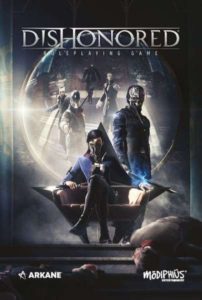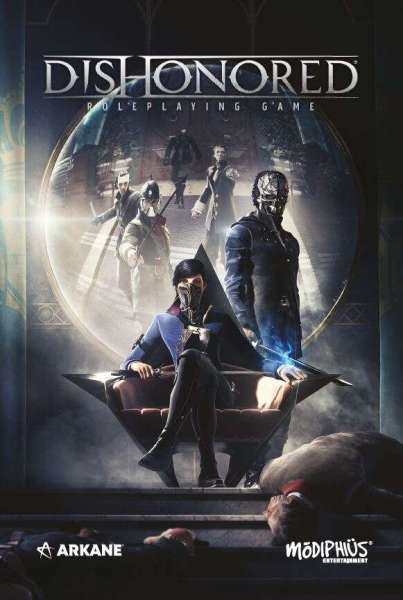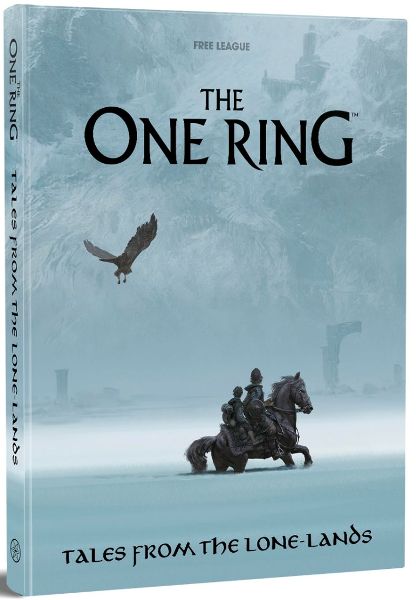
Dishonored Roleplaying Game
Dishonored Roleplaying Game is a dystopian Victorian fantasy RPG, written by Mari Tokuda, Anne Toole, Jason Brick, Danielle DeLisle, Nathan Dowdell, and Federico Sohns and published by Modiphius Entertainment.
By Aaron T. Huss

Learn more about Dishonored Roleplaying Game here
Purchase Dishonored Roleplaying Game here (paid link)
Find other Dishonored posts here
Dishonored is the latest licenses roleplaying game from Modiphius Entertainment powered by their in-house 2d20 system. It is placed within the Dishonored setting, from the video games from Arkane, and serves to create a thematically similar style of gameplay within a gaslamp fantasy setting. Although it is powered by 2d20, it is a customization of 2d20 much like it was for John Carter. The dice roll resolution mechanics are the same, but there are no Talent trees and magic is considerably different. Instead of the action/adventure of other 2d20 games, the focus is on action/reaction and the alteration of truths. In the setting, everything occurs because of some type of truth (because of this, that happens). When you do something cool, you are altering a truth by changing one factor (easier, harder, possible, not possible, etc.). Then the game reacts to your decision in some type of way, possibly factoring in later when the GM spends a Chaos point (the GM equivalent of spending momentum to alter the game in some way). It’s all about the back and forth and how throwing off the balance results in an opposing reaction. This concept of opposing forces through Momentum/Chaos appears to be the underlying theme that ties the RPG to the video game. Although characters still have mechanical representation including skills, just no Talent trees. In addition to all these game-related items, this core rulebook includes a very large gazetteer of the setting and plenty of adversaries to deal with. There is a lot of content here for mang great campaigns.
Dishonored is a pretty cool setting. Being that it’s attached to a series of video games, I’m not really surprised that it has such a rich setting. Along with that, the artwork is crazy awesome and the book looks great… but I have a couple critiques to note. First off, the page count seems high, but the book is laid out in 6.14 x 9.21 (also known as Royal) and includes a lot of white space. If the book was laid out differently, it could easily consume much less space. Second, I don’t think 2d20 is the right system to use for this action/reaction style of gameplay. 2d20 is awesome for games like Mutant Chronicles and Infinity, but when you strip out much of its core, it really loses its most powerful uses. Systems like PbtA do a much better job with this type of storytelling and its mechanics have many underlying action/reaction mechanics; it’s based on “yes you can do this, but this also happens.” The Momentum/Chaos points work well enough, but there are other systems that handle this too.
One thing I do really like about this version of 2d20 is Void Points used to power the setting’s version of extraordinary abilities. This version of magic is more akin to horror, like Call of Cthulhu, than it is to fantasy. Characters do not have unfettered access to these abilities and really need to earn the Void Points necessary to perform them. This plays in well to their action/reaction style – the action is what you do to regain Void Points and the reaction is the effect of when the points are spent. In fantasy games, you don’t have to really do much and can sling spells at ease. When you strip away the core 2d20 mechanics, the game really sticks to a common theme that is meant to tie back to the larger setting. In this sense, the execution is superb. For the mechanical aspects, I think it could have been done better another way. But then, this is only my personal opinion and by no means is meant to represent everyone’s gameplay expectations.
If you really like the John Carter style of 2d20, you will probably enjoy Dishonored. If you prefer Mutant Chronicles or Infinity, you might find Dishonored a bit awkward or have difficulties grasping the removal of some of the core mechanics. If you are a gamer who really likes Dishonored and have no preconceptions about 2d20, you may really enjoy the tabletop RPG version and the ability to create unique characters.


